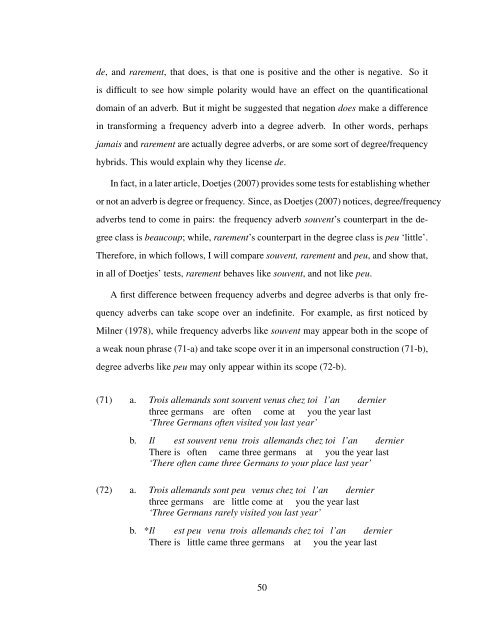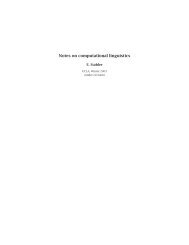Formal Approaches to Semantic Microvariation: Adverbial ...
Formal Approaches to Semantic Microvariation: Adverbial ...
Formal Approaches to Semantic Microvariation: Adverbial ...
Create successful ePaper yourself
Turn your PDF publications into a flip-book with our unique Google optimized e-Paper software.
de, and rarement, that does, is that one is positive and the other is negative. So it<br />
is difficult <strong>to</strong> see how simple polarity would have an effect on the quantificational<br />
domain of an adverb. But it might be suggested that negation does make a difference<br />
in transforming a frequency adverb in<strong>to</strong> a degree adverb. In other words, perhaps<br />
jamais and rarement are actually degree adverbs, or are some sort of degree/frequency<br />
hybrids. This would explain why they license de.<br />
In fact, in a later article, Doetjes (2007) provides some tests for establishing whether<br />
or not an adverb is degree or frequency. Since, as Doetjes (2007) notices, degree/frequency<br />
adverbs tend <strong>to</strong> come in pairs: the frequency adverb souvent’s counterpart in the degree<br />
class is beaucoup; while, rarement’s counterpart in the degree class is peu ‘little’.<br />
Therefore, in which follows, I will compare souvent, rarement and peu, and show that,<br />
in all of Doetjes’ tests, rarement behaves like souvent, and not like peu.<br />
A first difference between frequency adverbs and degree adverbs is that only frequency<br />
adverbs can take scope over an indefinite. For example, as first noticed by<br />
Milner (1978), while frequency adverbs like souvent may appear both in the scope of<br />
a weak noun phrase (71-a) and take scope over it in an impersonal construction (71-b),<br />
degree adverbs like peu may only appear within its scope (72-b).<br />
(71) a. Trois allemands sont souvent venus chez <strong>to</strong>i l’an dernier<br />
three germans are often come at you the year last<br />
‘Three Germans often visited you last year’<br />
b. Il est souvent venu trois allemands chez <strong>to</strong>i l’an dernier<br />
There is often came three germans at you the year last<br />
‘There often came three Germans <strong>to</strong> your place last year’<br />
(72) a. Trois allemands sont peu venus chez <strong>to</strong>i l’an dernier<br />
three germans are little come at you the year last<br />
‘Three Germans rarely visited you last year’<br />
b. *Il est peu venu trois allemands chez <strong>to</strong>i l’an dernier<br />
There is little came three germans at you the year last<br />
50
















